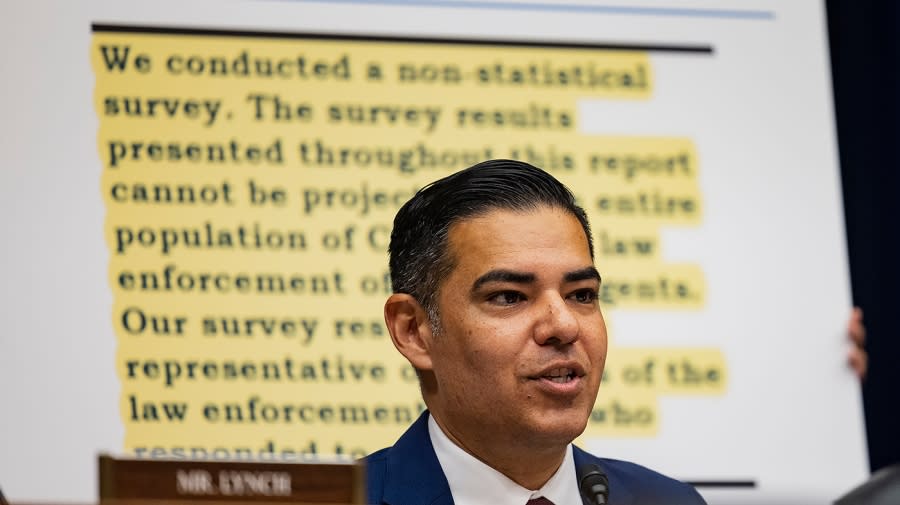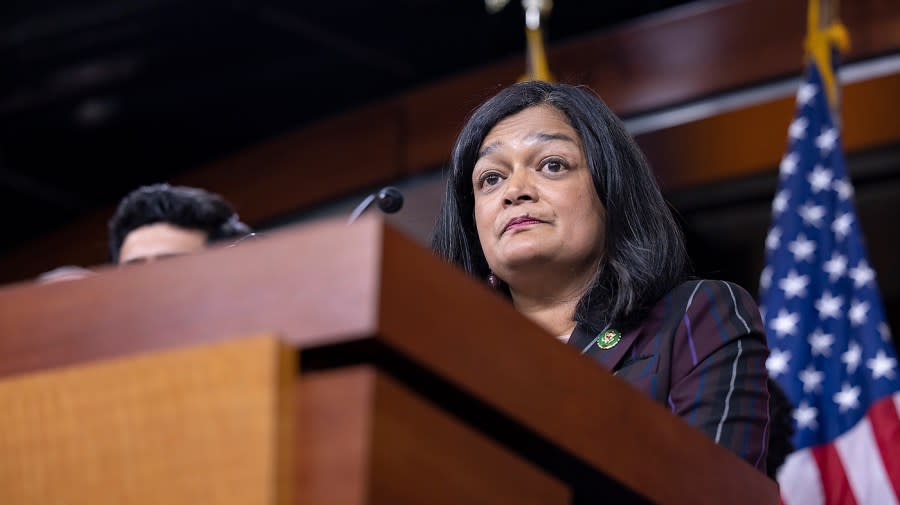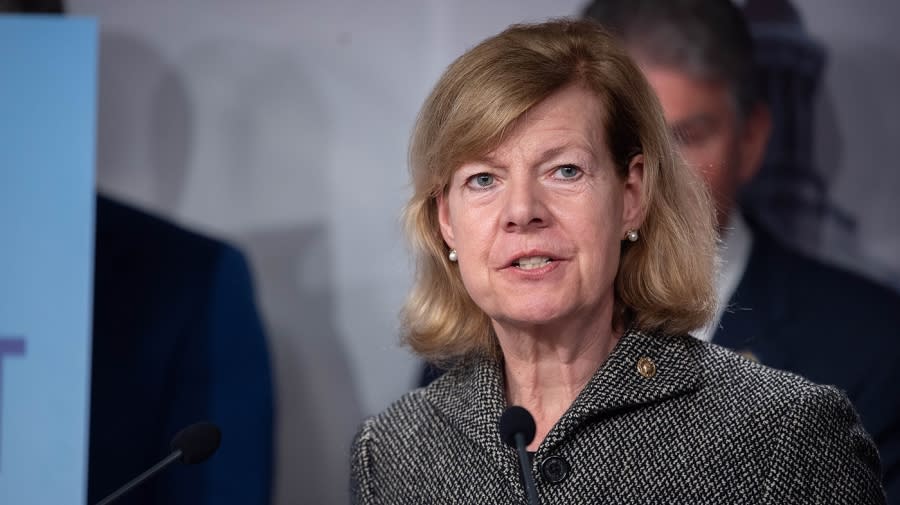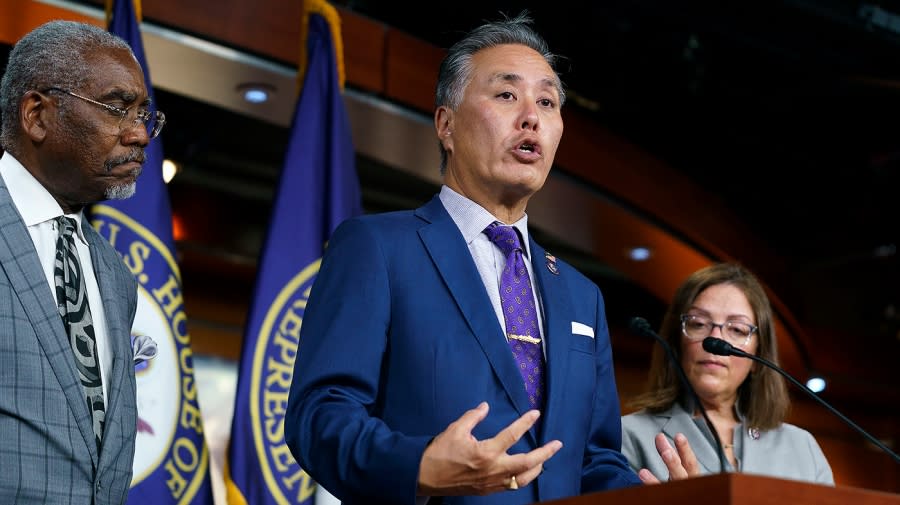Here are five lawmakers to watch in the fight for LGBTQ equality
- Oops!Something went wrong.Please try again later.
It has been a difficult year for LGBTQ rights advocates in and out of Congress, with 2023 already shaping up to become the worst year on record for anti-LGBTQ state legislation.
More than 490 bills targeting LGBTQ rights have been introduced in 44 states, according to the American Civil Liberties Union (ACLU). At least 77 have become law, most of them targeting transgender young people.
One lawmaker introduced a resolution last month to recognize and celebrate diverse family units as a way to push back against some of the anti-LGBTQ proposals.
Still, the pathway to full equality is steep.
House Republicans passed the nation’s first federal ban on transgender athletes this year, in addition to legislation that would require parents to be notified if their child is sharing a school restroom or changing room with a student who is transgender.
Bills to restrict access to gender-affirming health care for transgender youths and adults have also been introduced
None of those bills has progressed in the Democratic-controlled Senate, underscoring the stakes for the 2024 Senate elections.
Here are five lawmakers to watch in the fight for LGBTQ equality.
Rep. Robert Garcia (D-Calif.)

Rep. Robert Garcia (D-Calif.) speaks June 6 during a Subcommittee on National Security, the Border, and Foreign Affairs hearing at the Capitol. (Tierney L. Cross)
Garcia — the first LGBTQ immigrant elected to Congress — was labeled “America’s gayest congressman” by The Advocate this month, a title he whole-heartedly endorses.
“I can confirm that’s a hundred percent true,” he told The Hill this week.
The first-year lawmaker has emerged as a leading proponent of LGBTQ rights on Capitol Hill, co-sponsoring several pieces of legislation to advance LGBTQ equality.
Garcia last month introduced a resolution to formally recognize and celebrate diverse family units — including LGBTQ families and families who adopt — after Rep. Marjorie Taylor Greene (R-Ga.) suggested non-biological parents are not legitimate parents.
And on the House floor this month, Garcia honored “American phenomenon” and drag queen RuPaul Charles, part of a pledge to protect drag performers amid rising pushback from GOP leaders.
“I think for me — you have the first LGBTQ+ immigrant ever elected — I think that, you know, gives me a unique perspective. I certainly think representation is important and so, being like a strong voice … is a responsibility that I take very seriously,” Garcia said.
One of his more well-known legislative efforts was a push to expel Rep. George Santos (R-N.Y.), another openly gay lawmaker who has come under controversy for questions about his background and finances.
Garcia led a group of LGBTQ first-term lawmakers in introducing a resolution to expel Santos in February, noting the New York Republican’s controversial claim that he “lost four employees” in the Pulse nightclub shooting in 2016. The House ultimately voted to refer the resolution to the Ethics Committee.
Rep. Pramila Jayapal (D-Wash.)

Rep. Pramila Jayapal (D-Wash.) speaks during a House Progressive Caucus press conference on the threat of defaulting at the Capitol on Wednesday, May 24, 2023. (Tierney L. Cross)
A co-chairwoman of the Congressional Equality Caucus’s Transgender Equality Task Force, Jayapal has fought to protect and advance the rights of transgender Americans since her election to the House in 2017.
Jayapal in March, on the International Day of Transgender Visibility, reintroduced the Transgender Bill of Rights, a sweeping resolution that would strengthen civil rights protections for transgender and nonbinary people in the U.S.
Transgender equality is perhaps more personal to Jayapal than most: Her daughter, Kashika, is transgender. Jayapal shared her daughter’s identity publicly during a 2019 House hearing on the Equality Act, a bill that would add LGBTQ people to federal nondiscrimination laws.
“My beautiful, now 22-year-old child told me last year that they were gender nonconforming,” she said at the time. “The only thought I wake up with every day is: My child is free. My child is free to be who they are, and in that freedom comes a responsibility for us as legislators to protect that freedom.”
Sen. Tammy Baldwin (D-Wis.)

Sen. Tammy Baldwin (D-Wis.) addresses reporters during a press conference on Tuesday, March 7, 2023. (Annabelle Gordon)
Baldwin made history when she was elected to the Senate in 2012, becoming the first openly gay person elected to the upper chamber. She’s been chipping away at glass ceilings since 1999, when she became the first openly gay woman elected to the House.
In 2008, Baldwin co-founded the Equality Caucus, then the LGBT Equality Caucus, with former Rep. Barney Frank (D-Mass.), who is the first member of Congress to voluntarily come out as gay. It was the nation’s first congressional caucus dedicated solely to advancing LGBTQ rights.
More recently, Baldwin helped shepherd the Respect for Marriage Act through the last Congress’s 50-50 Senate.
Baldwin has also been a strong advocate for transgender equality in Congress.
In March, she joined 23 Senate Democrats in introducing a resolution to celebrate the International Day of Transgender Visibility and recognize the achievements and contributions of transgender people worldwide. This month, she reintroduced the LGBTQ+ Data Inclusion Act, which calls for federal mental health surveys to include questions about sexual orientation and gender identity to improve resources and services available to LGBTQ people.
“Our government works best when it reflects the people we serve. In order to create inclusive, fair policies that help all people lead healthy, safe, and successful lives, we must have diverse voices at the decision-making table,” Baldwin told The Hill in a statement.
Rep. Mark Takano (D-Calif.)

Rep. Mark Takano (D-Calif.) addresses reporters during a press conference on Wednesday, August 10, 2022. (Greg Nash)
Takano, who is one of 12 openly LGBTQ members of Congress, in 2012 became the first out gay person of color elected to Congress and the first openly LGBTQ lawmaker of Asian descent.
He’s used his platform to elevate LGBTQ voices and issues at home and abroad.
In March, Takano challenged a provision of the House Republican Parents Bill of Rights that requires teachers to obtain permission from parents before referring to a student by a different name or pronouns, warning that the measure would disproportionately impact transgender and nonbinary students. It could also put LGBTQ kids in danger of being forcibly outed to unsupportive families, he argued.
“This bill forces good teachers to do bad things,” Takano, a former high school teacher, said on the House floor in March. “It is a fundamental invasion of privacy that puts children in danger.”
Takano earlier this month reintroduced the Equality Act, which seeks to amend the Civil Rights Act of 1964 to prohibit discrimination on the basis of gender identity and sexual orientation.
Rep. Sara Jacobs (D-Calif.)

Rep. Sara Jacobs (D-Calif.) is seen during the first day of the 118th session of Congress on Tuesday, January 3, 2023. (Greg Nash)
For Jacobs, defending transgender rights on Capitol Hill is essential to the fight for LGBTQ rights. It is a lesson she learned from her two siblings, who are transgender and gender-nonconforming.
“Eventually, my siblings pulled me aside and they were like, ‘Look, we don’t always want to have to be the ones explaining ourselves. We want you to use your position to educate people so that every time we walk into a room, we aren’t the ones with the burden,’” Jacobs told The Hill last week.
“And for me, that was an important lesson and why I’ve really felt like it’s my job to step out and make sure that we’re doing everything we can to respond to the spate of horrible anti-trans legislation we’re seeing come from state legislatures and from this body, and why I’m gonna keep working to make sure that every kid in America can be their true authentic self,” she added.
Jacobs — a co-chairwoman of the Transgender Equality Task Force and the vice chairwoman of the Congressional Equality Caucus — officiated her transgender brother Dylan’s wedding last year, calling it “one of the proudest moments of my life” in a speech on the House floor.
In March, she introduced legislation to prohibit discrimination in the military and protect transgender service members. It would prevent the enforcement of any future policies targeting transgender health care in the military, including former President Trump’s transgender military service ban, which some GOP lawmakers have sought to reinstate.
Jacobs this year also co-sponsored the International Human Rights Defense Act, which would reaffirm the nation’s role in protecting and promoting LGBTQ rights across the globe.
For the latest news, weather, sports, and streaming video, head to The Hill.

